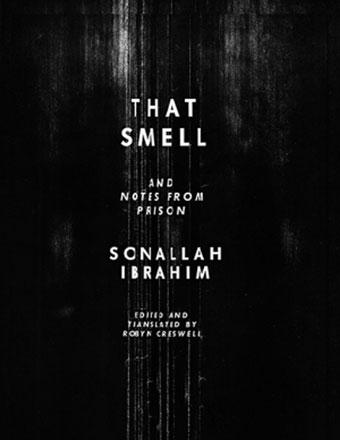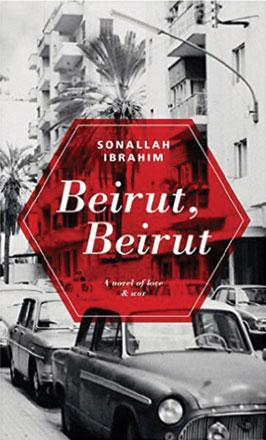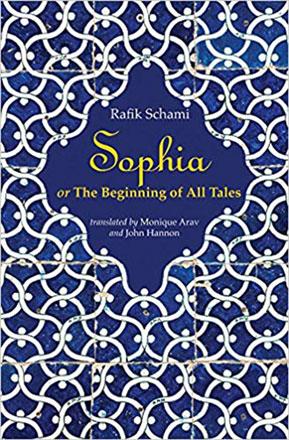You are here
Committed to innovation
By Sally Bland - Sep 21,2014 - Last updated at Sep 21,2014

That Smell and Notes from Prison
Sonallah Ibrahim
Edited and Translated by Robyn Creswell
New York: New Directions Books, 2013
Pp. 109
This is a new translation of Egyptian writer Sonallah Ibrahim’s ground-breaking novel, “That Smell”, which was first published in Arabic in 1966, immediately banned and dismissed by at least one prominent Egyptian literary critic for the “vulgarity” of its physiological descriptions. Meanwhile, the censors seemed most concerned that the protagonist appeared to be impotent. One would think from these attacks that the novel dwells on sex but that is not the case. “That Smell” is a first-person narration of how a man passes his days after being released from prison, but still under house arrest, based on Ibrahim’s own experience. The overwhelming impression he conveys is one of banality: nothing seems to matter much. “People walked and talked and acted as if I’d always been there with them and nothing had happened.” (p. 19)
A previous English translation of “That Smell” was included in a 1971 collection of stories, but Robyn Creswell, literary editor and professor of comparative literature, felt that a new translation was called for because the first one was too polished. Creswell wanted to replicate Ibrahim’s innovative style of simply recording raw impressions and happenings without commentary. Ibrahim called it “telegraphic style” and was greatly influenced by Ernest Hemingway’s idea of getting close to reality by pared-down description rather than expression of feelings (though the former thankfully avoided the latter’s machismo). According to Creswell, the novel’s narrator “has the impassivity of a trauma victim: he sees and hears and reports, but makes no claim to understand”. (p. 3)
The question of style is crucial because “That Smell” is considered groundbreaking mainly because of its raw minimalism and common language that breaks with Arabic literary norms. From that time, fifty years ago, Ibrahim felt that a politically committed writer must be experimental, in order to expose the shallowness and stagnation forced on people by regime repression. Since then, his pioneering role has been widely recognised by other Egyptian writers, such as Yousef Idriss who called “That Smell” “a revolution, the beginning of which is the author’s rebellion against himself”.
As for content, most noticeable is what is omitted. Knowing that the protagonist of “That Smell” was a political prisoner (Ibrahim was jailed for being a communist), one is surprised that there is no mention of politics--only daily routines, visits to friends and relatives, gossip, etc. But this is the point, the hidden social critique. When free expression is outlawed, when people are not engaged in improving their society, life loses meaning. The only thematic thread in the story is the narrator’s repeated attempts to write, which never amount to anything. If there is a question of impotence in the story, it is this.
Since what is left unsaid is the crucial point in “That Smell”, Creswell’s introduction is highly useful as it explains the political context in which Ibrahim was writing. Equally important is the inclusion of Ibrahim’s own introduction to the novel when it was finally republished in its entirety in Cairo in 1986. Here he defends the “ugliness” of his physiological descriptions as being warranted by the ugliness of visceral realities such as torture. He also sets out his guiding principles: “Self-criticism, an attention to the interior voice, recognition of the real, an impatience with bourgeois sensitivities and fads — all these continue to be at the basis of my work.” (p. 74)
The novel is complemented by excerpts from Ibrahim’s prison diary recorded in 1962-64 and rewritten on cigarette papers in order to be smuggled out of the jail. These notes reveal his search for a new way of writing, his views on the artist’s role in society, and his reactions to the literary and political trends of the times that the prisoners managed to follow via various publications smuggled into the prison. They are a shorthand account of the influences on his thinking and work, from the Soviet poet, Yevtushenko, to fellow Egyptian novelist Naguib Mahfouz.
In “That Smell”, one discovers the seeds of Ibrahim’s later writing, especially the full-blown novel, “Zaat”, which also relies on the interior voice and stark descriptions of everyday reality, but explicitly interjects the political causes of people’s malaise. This small volume adds greatly to an understanding of the development of modern Egyptian fiction and especially that of one of its foremost proponents and undisputed political conscience, Sonallah Ibrahim.
Related Articles
Beirut, BeirutSonallah IbrahimTranslated by Chip RossettiDoha: Bloomsbury Qatar Foundation Publishing, 2014Pp.
BAGHDAD — When Ahmed Saadawi finished writing “Frankenstein in Baghdad”, a dark fantasy about the war that tore Iraq apart a decade ago, he
Sophia, or the Beginning of All TalesRafik SchamiTranslated from German by Monique Arav and John HannonUS: Interlink Books, 2018Pp.


















